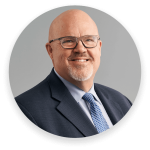As a part of our talent acquisition engagements, we ask our clients how they define “top talent” and how they would assess those traits in the interview process. Reflecting on the insightful comments we hear every day, we thought there would be great value in a new blog in which senior executives/thought leaders share their “Take on Talent.”
This is the twenty-second in a series of blogs/interviews with senior executives who are thought leaders in the areas of Talent Acquisition, Career Development and Leadership who will share their perspectives on this ever present question.
Kevin Campbell, Chief Executive Officer, Syniti
As CEO, Kevin drives the growth agenda of Syniti with poise and at ease. With a solid track record in driving growth at scale, Kevin joined Syniti, formerly BackOffice Associates, as president, global consulting and services April 2018, and was named as CEO in February 2019.
During his 20+ year, 2-term tenure at Accenture, he was Group Chief Executive for Outsourcing and Group Chief Executive Technology where he drove double-digit growth. Kevin was also CO-COO for Bridgewater Associates and COO for Oscar Health based out of New York.
As CEO, Kevin’s leadership remit here is simple: Inspire and empower those around him to deliver on the business’ vision and purpose. He oversees all aspects of our operation while also taking every opportunity to engage with customers, partners, and employees on the ground around the world.
At home and in relaxed mode, Kevin devotes himself to family life and the resulting bike rides and activities that come with such a commitment. He also coaches his children’s sports teams and can often be found at various sports fields hurling encouragement. This has even been turned in to a group activity when they attend Atlanta United FC as season ticket holders. Go five stripes!
Please share with us the top five characteristics (in priority order, first to fifth) of the most talented people you have encountered during your career, and your definition of each.
- Self Aware and Humble – A former mentor told me early on, “Kevin what will confound you is that the people who need the most help don’t ask for it, the people that don’t need as much help, ask a lot”. Over the years I have learned that this is a combination of people knowing that they don’t know everything (self aware) and people always seeking input from others to make sure they have checked their thinking (being humble) . One of the questions I like to ask in an interview is what are your weaknesses? Some people want to try the “I care too much or work too hard”, but you can gain insights to the person if they say things like “I often get so excited with my ideas, that I get carried away” or “I have a blind spot when it comes to certain capabilities”. Ray Dalio, the legendary investor, whom I worked for says, know and embrace your weaknesses, that is the key to being successful.
- Team/Customer First – I have worked with a lot of great talents over the years, but teamwork is a force multiplier and people who know how to collaborate and both lead teams and be part of teams is a key to success. When talking to people I like to note how many times they use “I” vs “we” when discussing accomplishments. I also like to challenge people with providing examples where the team’s idea was better than their own (or the majority thought so) and how they supplanted their thoughts and committed to the team direction and what was the outcome. I have also found that team- first people understand that serving the customer/client is priority. As another mentor once said, last time I checked all our revenue comes from our customers. And on the other hand all of us have examples of brilliant people that couldn’t work with others.
- Stretch/breaking through barriers – every successful and talented person has encountered difficult situations in his/her life. It’s how you deal with it that is key and the strengths you gain from those times . One example for me was when at Exult our stock went from around $8 to 1.52 in 12 hours after we were forced to change auditors. Who rallied, who were friends in the time of crisis, that sticks with you vs. the people who were Eeyore’s (Character from Winnie the Pooh). Asking people for examples like this or when they had a problem like nightly processing taking 72 hours to run and learning how they thought about the problem, what resources they brought to bear and what they learned. Learning is a big part of breaking through barriers and in today’s world being a life long learner is absolutely required so exploring how people learn new things and what their thirst for learning is, provides additional insights.
- Integrity/Transparency – Living our word, saying what you will do and doing what you say is critical. While very few people will ever say they lack integrity, but if you ask them for examples where they had ethical dilemmas or they promised to do something either individually or on behalf of their company and then had a challenge doing it, you will get some insights into the person’s morale compass. Also It’s critical that people are transparent. You will notice successful people, sometimes contrary to what people think, seldom play politics with their boss, spend little time tearing down those around them and often have little tolerance for not doing the right thing.
- Enjoy the ride, have fun, family – Universally, the most talented people I have worked around, know that everyday might be our last, realize that there is more to life than just work, genuinely care about others and are fun to be around. I like to know about the people I work with, what makes them tick, what gets them out of bed in the morning, challenges they have in balancing family commitments, etc. I find that the most talented people aren’t afraid to say, hey I got an event at my kids school so can we move that meeting and they are also genuinely care about others, and pick up on clues when someone is down (hey you don’t seem yourself or you seem stressed). So when talking to people about joining our team, I like to know what they do to relieve stress, what they like about their current teammates, and examples of how they ensure bring their whole selves to work.
How do you communicate these characteristics to your HR and senior management team?
At Syniti, we are fortunate to have gone through a rebranding exercise and as part of that we got input, discussed and debated and established our values. Not surprisingly our values represent what I and the leadership team think is important to have in each of us and our people. Customer First, Enjoy The Ride, Innovation/Breakthrough, Integrity and Teamwork.
I also have had a couple of hiring principles that I find helpful in communicating what I look for. First, when hiring anyone that is a direct report to me, I do the early interviewing, often the first interview. I learn what is available in the market, and get the chance to see first impressions and establish the hook of the candidate. I don’t communicate what I think of the candidate only if I want to stop further interviews. After others of my directs have interviewed the candidates, we discuss what our impressions are and what we see as the person’s strengths and areas of concern. It helps to make sure we don’t have group think and my views don’t influence others. I will also always have some members of my board interview any of my directs. I will then spend two more times talking with the person and when I conclude the right person, I communicate why I thought that person was the right candidate.
Second, I also request that I interview any of direct reports to my direct reports. I am open to when in the process I do this but I want to make sure I understand why we are hiring the person, what we are looking for and how their success will be judged. It’s also a chance for me to establish a skip level relationship. We use the same principles when transferring or promoting people into a role that is a direct report to one of my directs. Even though the person is already within the company, its good hygiene to ensure same standards are applied as with a new hire.
How do you handle challenges to the existing culture by talent you have brought in?
In my view, culture in today’s world cannot be stagnant, it needs to reflect an evolution that mirrors how a business is evolving and what is needed to get to the next stage in a company’s growth. As a leadership team we sat down shortly after I became CEO and did a design thinking exercise around the type of company we wanted to be, both in terms of objectives and feel and characteristics. It included our values and also included our purpose. All of this to say that, we defined what we wanted our culture to evolve to and set about making it happen. As with any move forward the power of the past is a challenge to change. The forces of resistance can stop the evolution. To counteract the resistance I ask HR and my leadership team to demonstrate the values we want, to recognize people that are demonstrating our values and retrain or replace people following counter behaviors. Ultimately, culture is about performance and values. People, new or long timers, have to perform and demonstrate the values of the company. If they don’t do both, they are not a good fit and have to leave. Otherwise, our values and culture are compromised, becoming words.




